History of Greece and the Balkans
Bronze Age (c. 3200–600 BC)
1900 First Minoan palace built at Knossos Crete
- 1788 Chaos gives birth to Gaia
- 1770 Gaia gives birth to Uranus
- 1750 Uranus rapes Gaia but he hated the children she bore him. The Titans, six sons and six daughters, the Hecatonchires and the Cyclopes He imprisoned Gaia’s youngest children in Tartarus, deep within Earth, which they caused pain to Gaia. She shaped a great flint-bladed sickle and asked her sons to castrate Uranus. Only Cronus, youngest of the Titans, was willing.
1710 The Titans fight Uranus and eventually he is defeated by Cronus. Cronus cuts off Uranus‘ genitals with a sickle and throws theminto the sea. From the blood which spilled from Uranus onto the Earth came forth the Gigantes, the three avenging Furies—the Erinyes— and Meliae, the ash-nymphs and Aphrodite emerges naked from the sea and travels to Cyprus.
The Golden Age of Mankind (1710 – 1674) The Golden Age is the only age that falls within the rule of Titans,
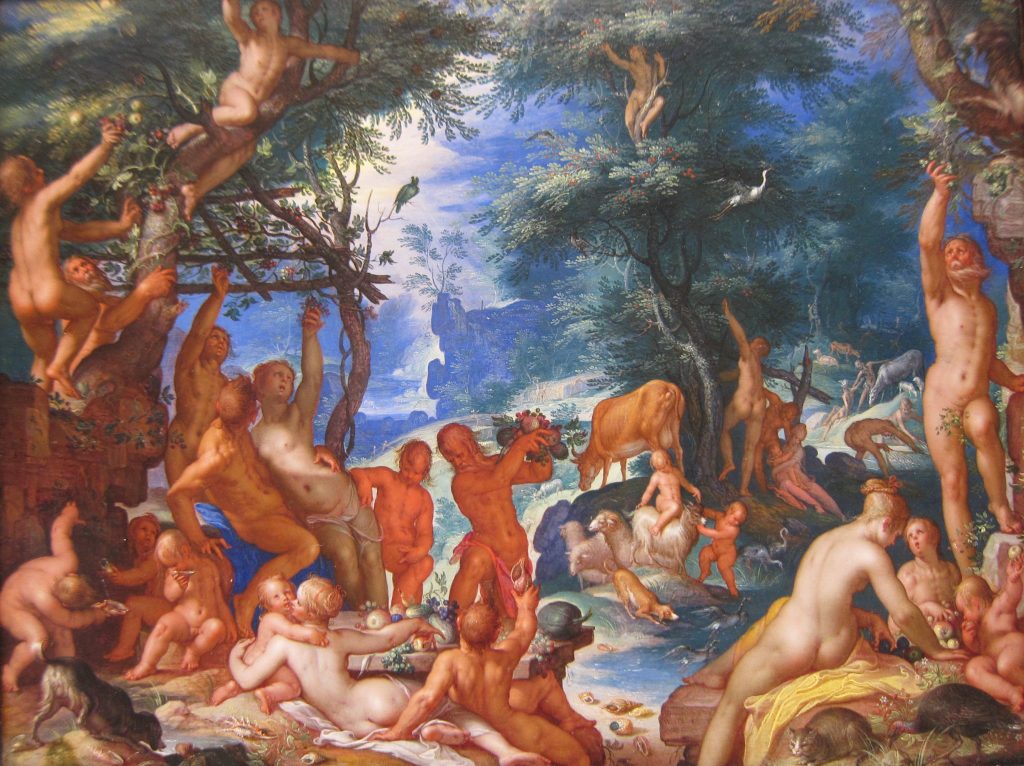
1705-1675 – Cronus becomes ruler of Greece. Imprisons the Hecatonchires and Cyclopes in Tartarus, then organises the Titans giving each a dominion.
1703 BC Cronus is warned not to take Rhea as his wife or have children with her, otherwise one of his children will dethrone him. He ignores this and Rhea gives birth to Hestia, Demeter, Hera, Hades, Poseidon, and Zeus. Cronus swallows his children in order to avoid the prophesy but astone is substituted by Rhea in place of Zeus who is taken by his mother into hiding in Crete.
1703-1684 Zeus grows up in the Dictyan caves near Lato. When fully gown he makes Cronus drunk, causing him to vomit out his brothers and sisters.
1700 BC Palace at Knossos destroyed c. then rebuilt (14 royal tombs at Mycenae date between 1650-1550. Thera volcano erupts in 1628. Minoan palace at Knossos destroyed by earthquakes c.1600)
1684 The Titanomachy
The Titanomachy, (War of the Titans), was the ten-year series of battles between the two camps of deities long before the existence of mankind: the Titans, based on Mount Othrys, and the Olympians, who would come to reign on Mount Olympus. This Titanomachia is also known as the Battle of the Titans, Battle of Gods, or just The Titan War.
After the youngest Titan, Cronus, overthrew his own father, Uranus, with the help of his mother Gaia. Cronus then castrated his father, took his throne, and released his fellow Titan siblings, who had been locked away in Tartarus under Uranus’ tyrannical and selfish reign.
However, as Uranus was usurped, he made a prophecy that Cronus’ own children would rebel against his rule and castrate and depose him just as he and his siblings had done to him. For fear of his unborn children rising against him, Cronus now turned into the terrible king his father Uranus had been fearing their strenght he re-imprisoned the Hecatonchires and Cyclopes in Tartarus.
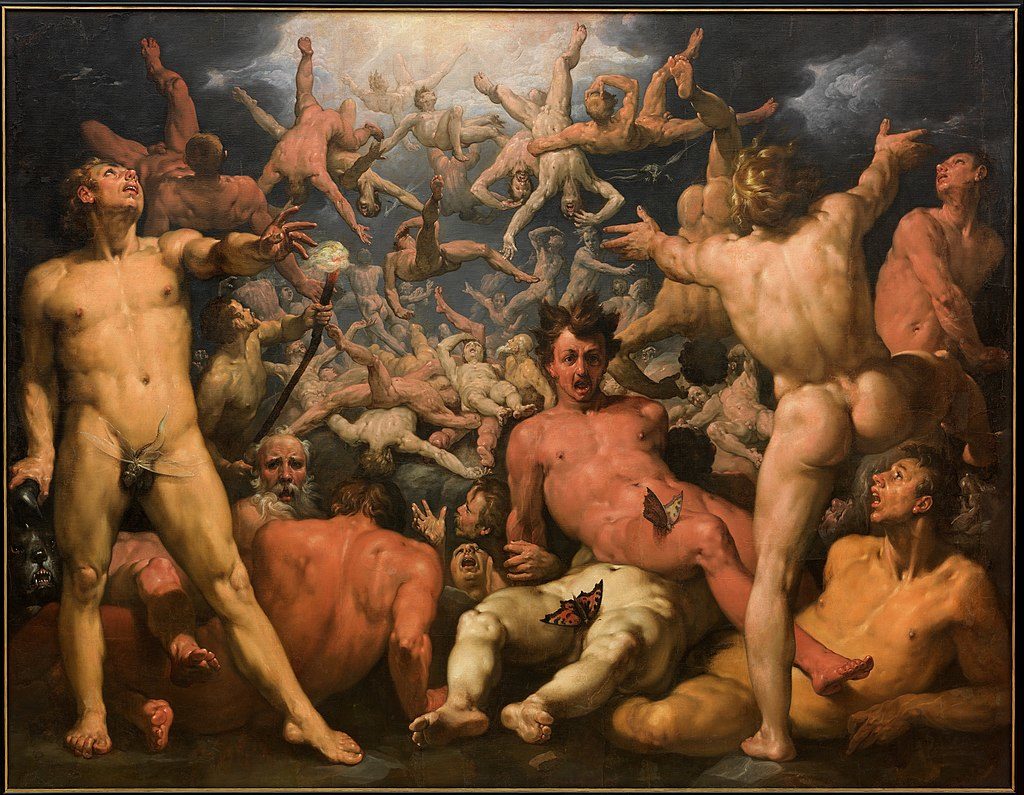
After marrying from his wife (and sister) Rhea, he swallowed each of his children whole as they were born – Hestia, Demeter, Hera, Hades, and Poseidon. Being immortal, this did not kill them, but they remained trapped inside him. Rhea grieved for the loss of her children. So, when she was close to giving birth to Zeus, she consulted with her parents Gaia and Uranus. They revealed the future to her, showing her how to thwart Cronus. When Cronus came to Rhea for their child, Rhea gave him instead a stone, wrapped in cloths. Not noticing, he swallowed the stone instead. Rhea brought Zeus to a cave on an abandoned island, where Zeus was raised.
When Zeus grew up, he went to one of Cronus‘ parties disguised as a fellow Titan, and gave Cronus some special potion, which caused Cronus to vomit up his swallowed siblings. Zeus then led his brothers and sisters in rebellion against the Titans.
Now the Olympians, led by Zeus, declared war against the previous generation of deities, the Titans. The Titans who fought were led by Cronus and included: Coeus, Crius, Hyperion, Iapetus, Atlas, and Menoetius. The Olympians (Zesus’s siblings) led by Zeus. Additionally, the Hecatonchires,
the Gigantes and Cyclopes, who had been imprisoned by Cronus, assisted in the revolt. The Hecatonchires helped the Olympians by hurling huge stones at the Titans. The Cyclopes helped by crafting Zeus‘ famous weapon, the lightning bolt.
Having at last won victory after a full decade of war, the Olympian gods divided the spoils between themselves, granting dominion of the heavens and sky to Zeus, the sea to Poseidon, and the underworld to Hades. The Olympians then shut the defeated Titans within Tartarus. However, since during the war Oceanus and the Titanides (female Titans), Thia, Rhea, Themis, Mnemosyne, Phoebe, Hecate, Metis and Tethys, had remained neutral, they were not punished by Zeus. Some other Titans who were not imprisoned in Tartarus include: Atlas, Cronus, Epimetheus, Menoetius, and Prometheus. Zeus gave Atlas a different punishment. The sky, nearly collapsed onto the earth after the war because so much fighting had occurred below. As a result, Zeus condemned Atlas to hold up the heavens and sky for eternity. Epimetheus, Menoetius, and Prometheus switched sides and aided Zeus in the war therefore they were not punished. Cronus manage to flee after the war, thereby avoiding imprisonment in Tartarus. The Hecatonchires remained to guard over the prisoners of Tartarus.
- 1684 Inachus becomes king and judges that the land of the Peloponnese belongs to Hera
- 1674 Victory for Zeus. Cronus is exiled to Elysia or Sicily. Zeus rules the heavens, Poseidon the sea and Hades the underworld. The land is common to all of the Gods.
- 1674 Zeus takes his sister Hera as wife
- 1674 Births of Hephaestus, Ares, Eris, Hebe.
The second age: The Silver Age of Mankind (1674-1628) – The Silver Age and every age that follows fall within the rule of The Gods.
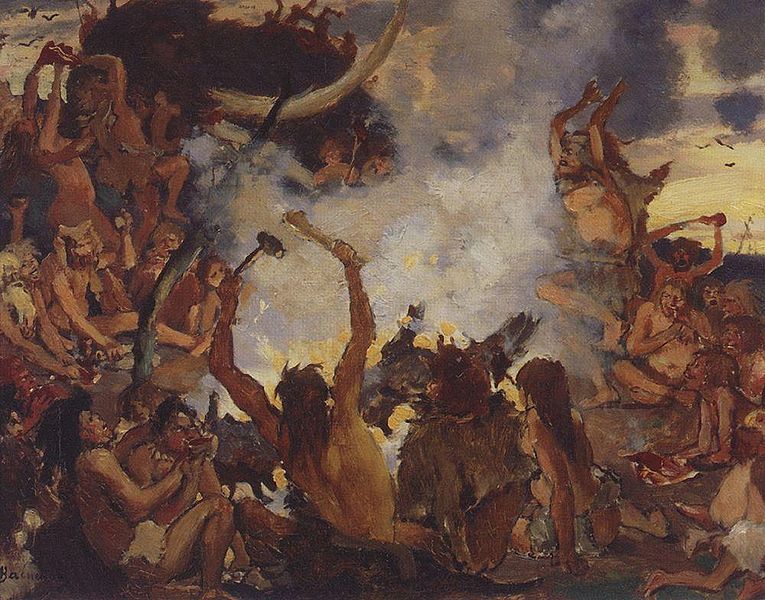
In the silver age Zeus reduced the spring, and reconstructed the year into four seasons, so that men for the first time sought the shelter of houses and had to labor to supply their food.
The first seeds of grain were placed in the ground since now man had to gather their own food. A child grew up at his mother’s side a hundred years, but adulthood lasted a short time.
Bridging the age when gods lived alone and the age when divine interference in human affairs was limited was a transitional age in which gods and mortals moved together. These were the early days of the world when the groups mingled more freely than they did later.
- 16740-67 Births of Apollo, Artemis, Hermes, Athena by different mothers.
- 1667 Prometheus is chained to the rocks after stealing the secret of fire from the Gods and giving it to man
- 1667 Zeus has affair with Io the daughter of Inachus and carries her off to Egypt where she marries Telegonus.
- 1664 Herakles the Dactyl holds the first Olympic Games
- 1659 Phoroneus son of Inachus, the first man, rules over the entire Peloponnese from Phronocium later to become Argos
- 1654 Epimetheus is given Pandora to be his wife. Pandora is given a jar as a wedding present and told not to open it. Pandora opens it and mankind suffers the consequences of disobedience.
1640 Gigantomachy The Battle of the Gods and Giants errupts and Porphyrion is defeated.
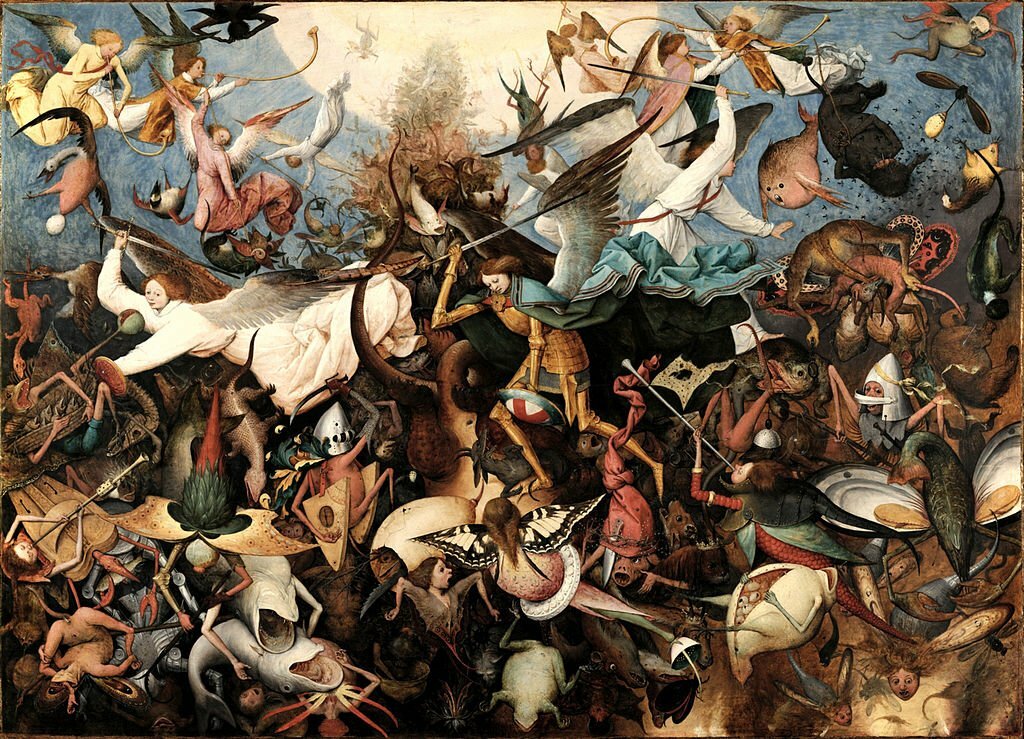
Gigantes a race of giants children of Gaia, were fertilized by the blood of Uranus that resulted from his castration by Cronus.
The Gigantes rose up in arms against the Olympians in an attempt to end the Olympian reign. They tested the strength of the Olympian gods in what is known as the Gigantomachia or Gigantomachy.
Led on by Alcyoneus, Porphyrion and Enceladus the Gigantes hoped to reach the top of Mount Olympus by stacking the mountain ranges of Thessaly, Pelion and Ossa, on top of each other. With the aid of their powerful weapons the Olympians defeated the Gigantes and quelled the rebellion, confirming their reign over the earth, sea, and heaven, and confining the Gigantes to Tartarus.
1628 Epaphus is murdered. The Titans attempt to regain power but fail. Atlas is punished by being made to carry the heavens on his shoulders. Typhon is defeated and imprisoned under a volcano.
Men of the Bronze Age were hard. War was their purpose and passion. Not only arms and tools, but their very homes were forged of bronze. The men of this age were undone by their own violent ways and left no named spirits but dwell in the “dank house of Hades”. It came to an end with the flood of Deucalion.
- 1628 Zeus seduces Niobe the daughter of Phoroneus (first of Zeus affairs with mortal women)
- 1628 Car the son of Phoroneus founds the city of Megara
- 1628 Apis rules over the Peloponnese and Egypt
- 1607 Argus the grandson of Phoroneus founds the city of Argos (Achaean invaders reach region of Mycenae c.1600 BC)
- 1572 Criasus the son of Argus becomes king of Argos. Peiras his brother, founds the first temple of Hera in Argolis.
- 1527 Lelex is the first king in Lacedaemonia.
- 1517 Pelasgus rules over Arcadia.
- 1510 Polycaon son of Lelex rules in Messenia and Myles rules in Sparta.
- 1488-14 Lycaon provokes the Gods anger by murdering his son Nyctimus and serving his up to the Gods.
- 1488 Danaus flees from Aegyptus to Rhodes then takes Pelasgian Argos
- 1487 Lycaon king of Arkadia, introduces Zeus cult
- 1484 Cecrops king of Athens introduces Zeus cult
- 1472 – Danaus becomes king of Argos in the Peloponnese after Gelanor steps down
- 1460 A flood is sent by Zeus to destroy all of mankind after Lycaon outrages the Gods. Deucalion and his family escape in an Ark, which Prometheus tells him to build.
- 1450 BC—Minoan Second Palace period ends and Late Minoan culture starts.
- (Mycenaean’s conquer Minoans in Crete c.1450 BC. Earthquake destroys city of Knossos c.1450 BC. Palace is rebuilt and used until c.1380 BC)
- 1440 – Dardanus founds Troy after being given a share in the kingdom of Teucer king of Phrygia
- 1438 – Zeus violates Europe, birth of Minos
- 1437 – King Erichthonius I of Athens dies after a reign of 50 years and is succeeded by his son Pandion I
- 1437 – Cadmus colonises Boeotia and founds Thebes.
- 1421- Minos I becomes king of Crete
- 1420 – Crete conquered by Mycenae start of the Mycenaean period.
- 1420 – Dionysus the son of Zeus and Semele daughter of Cadmus is born
- 1420 –Persephone the daughter of Demeter is abducted by Hades
- 1410 – Olympic Games held 50 years after the flood
- 1404 – Dionysus is entertained by Amphyction king of Athens
- 1400 – Cinyras the son of Paphos the son of Pygmalion the son of Belus funds the city of Paphos in Cyprus
- (Cyprus is conquered by the Mycenaean’s and Minoan colony wiped out c.1400)
- 1400 – Thebes, capital of Egypt becomes the largest city of the world, taking the lead from Memphis in Egypt.
- 1399 Erichthonius now rules at Athens
- 1399 Erichthonius rules at Troy
- 1397 Pandion I, legendary King of Athens, dies after a reign of 40 years and is succeeded by his son Erechtheus II of Athens.
- 1386 Dionysus known as Tauro Kranos restores Ammon as king of Egypt then conquers Damascus and all of India.
- 1386 Dionysus drives Pentheus the king of Thebes to madness
- 1385 Cadmus leaves Thebes and goes to Illyria
- 1377 Tectemus the son of Dorus founds colony in Crete and fathers Asterius
- (Second Mycenaean wave of colonisation in Crete puts and end to Minoan palace civilisation c.1400 BC)
- 1375 Minoan culture ends on Crete.
- 1375 Site of palace complex Knossos is abandoned.
- 1374 Pandion becomes king of Athens
- 1370 Athamas rules over Boeotia
- 1368 Death of Erichthonius, King of Dardania.
- 1365 Perseus son of Danae by Zeus is born
- 1363 Apollo fathers Asclepius by Coronis, daughter of Phlegyas
- 1360 Epopeus king of Sicyon at war with Thebes
- 1357 Pandions daughter Philomela marries Tereus king of Thrace to form alliance against Theban king Labdacus
- 1354 Erechtheus becomes king of Athens
- 1345 Phrixus while a boy is taken to Colchis by a Golden Lamb
- 1344 Pegasus the winged horse born from Medusa’s blood after she is slain by Perseus
- 1342-1320 The children of Perseus and Andromeda are born
- (Fortress of Mycenae built between 1400 and 1200)
- 1341 Perseus accidentally kills his grandfather Acrisius at funeral Games of King Teutamides father
- 1333 Bellerophon goes to king Proetus court to be purified
- 1329 Cecrops the eldest son of Erechtheus is chosen by Xuthus to become king of Athens
- 1325 Amphion kills Lycus and becomes king of Thebes
- 1320 Melampus the seer cures the madness of the Argive women and receives one third of Proetus kingdom and his brother Bias another third. First temple built to Dionysus.
- 1315-1264 Pelops the son of Tantalus king of Phrygia and Lydia flees Asia Minor and rules in Pisa and Olympia
- 1314 Pelops sister Niobe marries Amphion king of Thebes
- 1314 Pelops holds Olympic Games
- 1314 The Argonauts Calais and Zetes are born to Oreithyia and Boreas
- 1314 Pelops marries Hippodamia
- 1310 Electryon becomes king of Mycenae
- 1309 Cecrops II, legendary King of Athens, dies after a reign of 40 years and is succeeded by his son Pandion II. Pandion II was later driven into exile from Athens by the sons of Cecrops II’s brother (or possibly nephew) Metion, so that Metion could take power. Pandion II fled to Megara, where he married the King’s daughter and eventually inherited the throne. After his death, Pandion II’s sons returned to Athens and drove out the sons of Metion.
- 1309 Pandion becomes king of Athens and is expelled by the sons of Metion
- 1301 Oebalus becomes the second husband of Gorgophone the daughter of Perseus
- 1300 Laius caries off Chrysippus the son of Pelops and Astyoche
- 1299 Minos II the grandson of Minos becomes king of Crete after Asterius dies
- 1290 Procris leaves her husband and is seduced by Minos in Crete
Hesiod’s fourth age: The Heroic or Second Brazen Age ( 1286 -1103) The monumental events of Heracles are regarded as the dawn of the age of heroes. To the Heroic Age are also ascribed three great events: the Argonautic expedition, the Theban Cycle and the Trojan War. – In this period men lived with noble demigods and heroes.
- 1286-1264 Sthenelus takes throne of Mycenae after Amphitryon kills Electryon son of Perseus
- February 10 1286 Heracles is conceived when Zeus extends one night into three
- November 4 1286 Heracles is born nine months later and named Palaemon
- 1285 Heracles strangles 2 serpents sent by Hera
- 1285 Asclepius is born to Arsinoe, the daughter of Leucippus
- 1284 Aegeus regains Athens from the sons of Metion
- 1283 Bias of Priene killed by his nephew Pylas
1282 BC—Pandion II, legendary King of Athens, dies after a nominal reign of 25 years. He reportedly only reigned in Megara while Athens and the rest of Attica were under the control of an alliance of Nobles led by his uncle Metion (son of Erechtheus of Athens) and his sons (including in some accounts Daedalus). His four sons lead a successful military campaign to regain the throne. Aegeus becomes King of Athens, Nisos reigns in Megara, Lykos in Euboea and Pallas in southern Attica.
The monumental events of Heracles are regarded as the dawn of the age of heroes. To the Heroic Age are also ascribed three great events: the Argonautic expedition, the Theban Cycle and the Trojan War.
- 1282 Aeacus helps Poseidon build the walls of Troy for Laodamaon now king of Troy
- 1274 Pelias imprisons Aeson and takes the throne after the birth of Jason
- 1271 Theseus is born
- 1270 Aegeus accidentally kills Minos son Androgeus at Games held in honour of Laius king of Thebes and is forced to pay a tribute of 7 Athenian boys and girls every 9 years
- 1270 All of Greece plagued by earthquakes and famine due to Pelops murder of Stymphalus or the Athenians murder of Androgeus and Aeacus is sent to pray for deliverance.
- 1269 Atreus and Thyestes march against Laius the king of Thebes
- 1269-1235 Oedipus kills Laius the king of Thebes and marries his own mother Iocasta
- 1268 Heracles lies with Thespius 50 daughters and kills the Lion of Cithaeron
- 1264 Heracles marries Megara after defeating the Minyans while Creon is king of Thebes in place of Laius
- 1258-1246 The Labours of Heracles take place while Eurystheus is king of Mycenae
- 1253 Herakles brings back Alcestis the wife of Admetus from death
- 1252 Theseus kills the Minotaur at the centre of the Labyrinth built by Daedelus
- 1251 The Caledonian Boar hunt
- 1248 Heracles goes to Hades to bring back Cerberus
- 1247 The nine Muses who said to be the daughters of Peirus the Macedonian engage in a musical contest with Thamyris
- 1247 The marriage of Peleus to his second wife Thetis
- 1246 The birth of Achilles
- 1246 The 4 month long voyage of Jason and the Argonauts
- 1246 Heracles shot and killed the eagle that tortured Prometheus (which was his punishment by Zeus for stealing fire from the gods and giving it to mortals). Heracles freed the Titan from his chains and his torments. Prometheus then made predictions regarding further deeds of Heracles.
- 1246-1243 Heracles is sold as a slave to Omphale after killing Iphitus
- 1246 Eumolpus is victorious in the flute contest at Pelias funeral games
- 1245 Orpheus tries to rescue Euridice from Hades
- 1243 Heracles sacks Troy and puta young Priam on the throne (Troy VII destroyed c.1250 BC)
- 1243-1238 Heracles settles old scores in the Peloponnese
- 1242 Heracles conquers Elis and establishes Olympic Games. Polydeuces is champion Boxer.
- 1241 Heracles places Nestor who is still a boy on the throne of Messenia after killing his brothers and father king Neleus of Pylos for helping the Elians
- 1240 Heracles defeats the sons of Hippocoon and restores the throne of Sparta to Tyndareus
- 1239 Heracles leaves the Peloponnese and marries Deianira
- 1238 Hyllus is born
- 1236 Medea flees from Corinth after murdering Glauce the daughter of Creon
- 1235 Heracles exiled to Thrachis after killing one of Oeneus kinsmen
- 1234 Nessus carries of Deianira and is killed by Heracles with a poison arrow
- 1233 The births Clytemnestra & Helen to Tyndareus and Leda (Last of Zeus’s affairs with mortals)
- 1232 Chiron accidentally shot in the foot while entertaining Heracles and Achilles his student, forcing him to give up his immortality
- 1230 The birth of Paris. Laius becomes father of Odysseus.
- 1229 Heracles kills Cycnus the son of Ares
- 1227 Prophecy revealed from Oracle of Dodona that Heracles would die in 15 months after carrying off Iole
- August 12 1226 Heracles dies and becomes a god
The Hellenic Wars
- 1225 The seven make war against Thebes
- 1224 Theseus captures Thebes and buries the bodies of the seven which were left unburied by Creon.
- 1223 Eurystheus defeated by Theseus and beheaded by Hyllus the son of Herakles
- 1222 Centauromachy

The battle with the Centaurs at the wedding feast of Pirithous, the Centauromachy. The centaurs had been invited, but, unused to wine, their wild nature came to the fore. When the bride was presented to greet the guests, the centaur Eurytion leapt up and attempted to rape her. All the other centaurs were up in a moment. In the battle that ensued, Theseus came to the Lapiths’ aid. In the battle the Lapith Caeneus was killed, and the defeated Centaurs were expelled from Thessaly to the northwest.
March 5 1223 Atreus takes the throne of Mycenae
- 1221 Theseus abducts Helen when she is 12 years old and he is 50 and spends 4 years in Tartarus after Helens brothers the Dioscuri capture Athens
- 1220 Castor, Polydeuces and Idas and Lynceus begin feuding
- 1218 After several bad harvests Atreus is slain by 7 year old Aeigisthus and Thyestes takes the throne of Mycenae
- 1215 Agamemnon is restored as king Mycenae by Thyestes.
- 1215 The Epigoni attack Thebes
- 1213 Herakles mother Alcmene dies at the age of about 90
- 1213 The Beauty contest. Menelaus marries Helen.
- 1207 Theseus is freed from Tartatrus by Heracles and returns to Athens.
- 1207 The Heraklids attack the Peloponnese.
- 1206 Theseus, legendary King of Athens, is deposed after a reign of 30 years and succeeded by Menestheus, great-grandson of Erichthonius II of Athens and second cousin of Theseus’ father Aegeus. Menestheus is reportedly assisted by Castor and Polydeuces of Sparta, who want to reclaim their sister Helen from her first husband Theseus. Theseus seeks refuge in Skyros, whose King Lycomedes is an old friend and ally. Lycomedes, however, considers his visitor a threat to the throne and proceeds to assassinate him.
- 1203 – Hyllus the son of Herakles is slain at the Isthmus of Corinth while fighting in single combat against Echemus
- 1203 – Helen is abducted by Paris.
- 1201- First Gathering at Aulis
- (A massive tidal wave swamps the Aegean and reaches Cyprus in c.1200 BC)
- 1175 BC – (Ramses III expels Sea-Peoples from Egypt in 1175 BC. Among those named are the Peleset, Tjeker and Denyen, ie. the Pelasgians, Teukrians and Danaians who are said to be based in Cyprus)
- 1193 – Second Gathering at Aulis. The attempted sacrifice of Iphigenia.
- 1191 – BC—Menestheus, King of Athens, dies during the Trojan War after a reign of 23 years and is succeeded by his nephew Demophon, a son of Theseus.
- 1184 – BC—April 24, the traditional date of the fall of Troy.
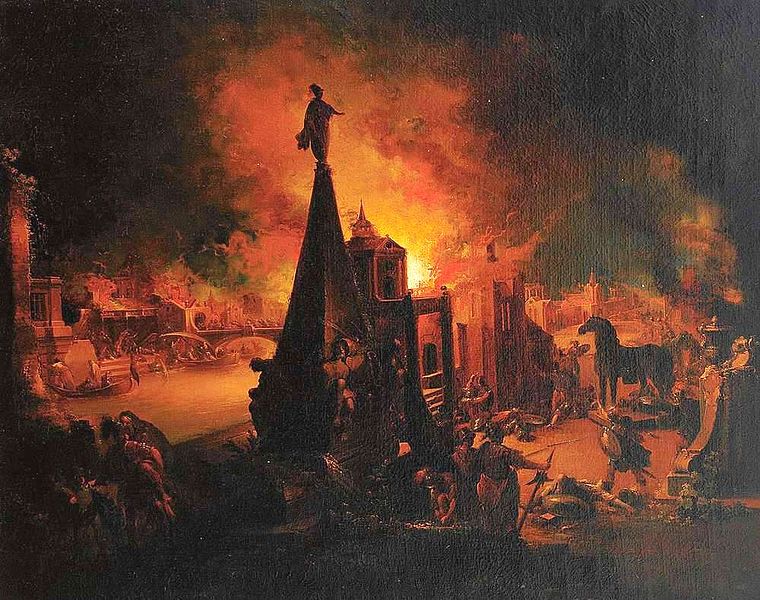
on canvas, 54,5 x 68 cm. From the collections of the granddukes of Baden,
Karlsruhe
The Trojan War was a war waged against the city of Troy in Asia Minor, by the armies of the Greeks, after Paris of Troy stole Helen from her husband Menelaus, king of Sparta.
The war sprang from a quarrel between the goddesses Athena, Hera and Aphrodite, after the goddess Eris (“Discord”) gave them a golden apple with the inscription “to the fairest” (known as the apple of Discord) at the wedding feast of Peleus and Thetis. The goddesses went to Paris, who judged that Aphrodite, as the “fairest”, should receive the apple. In exchange, Aphrodite made Helen, the most beautiful of all women, fall in love with Paris, who took her to Troy. Agamemnon, king of Mycenae, and the brother of Menelaus, led an expedition of Hellenic troops to Troy and besieged the city for ten years. After the deaths of many heroes, including the Greeks Achilles and Ajax, and the Trojans Hector and Paris, the city fell to the ruse of the Trojan Horse. The Greeks mercilessly slaughtered the Trojans and desecrated the temples, thus earning the gods’ wrath. Few returned to their homes and many founded colonies in distant shores.
1100 Brutus, grandson of Aeneas, leads a group of Trojan exiles to Britain. High Kingship of Brutus, followed by Locrinus, Gwendolen, Maddan, Mempricius, Ebraucus and Brutus Greenshield.
Aegean Iron Age (1183 –700 BC)
1183 – * Iron Age – During this age humans live an existence of toil and misery and the gods will have completely forsaken humanity: “there will be no help against evil.”
- Jan 12 1183 The return and murder of Agamemnon
- 1183-1173 The Odyssey
- 1183 Agapenor becomes king of Paphos in Cyprus
- 1180 Teucer founds Salamis in Cyprus
- 1179 Odysseus held captive by Calypso
- 1178 The suitors vie for Penelope
- 1175 Menelaus flees Egypt
- 1175 The vengeance of Orestes against Clytemnestra and Aegistheus
- 1175-1174 Orestes is pursued by the Erinnyes
- 1173 Odysseus returns to Ithaca. Hermes fathers Pan by Penelope
- 1181 —Menestheus, legendary King of Athens and veteran of the Trojan War, dies after a reign of 23 years and is succeeded by his nephew Demophon, a son of Theseus.
- 1173 Orestes kills Aletes son of Aegistheus grandson of Thyestes after he usurps the throne when Orestes ends his search for Iphigenia
- 1160 Odysseus is accidentally killed by his son Telegonus
- 1158 Orestes is told by the Delphic Oracle to move from Mycenae to Arkadia and is killed by a snake bite while founding new cities.
- 1154 —Death of King Menelaus of Sparta
- 1154 —Suicide of exiled Queen Helen of Sparta at Rhodes.
- 1153 Autesion expelled from Thebes after he defects to the Heraklids.
- 1153 The Herakilds resume their attacks on Mycenae fifty years on.
- (Indications of serious destruction of houses outside walls of Mycenae c.1150 BC)
- 1153 The Pelasgians and Thracians capture Thebes
- 1150 Demophon dies in Cyprus
- 1147 —Demophon King of Athens and veteran of the Trojan War, dies after a reign of 33 years and is succeeded by his son Oxyntes.
- 1135 —Oxyntes King of Athens, dies after a reign of 12 years and is succeeded by his elder son Apheidas.
- 1134 —Apheidas King of Athens, is assassinated and succeeded by his younger brother Thymoetes after a reign of 1 year.
- 1130 The Cadmians return to Thebes and expel the Pelasgians who then flee to Athens.
- 1130 Penthilus the son of Orestes seizes Lesbos
- 1129 Xanthus the last king of Thebes is killed in a duel with Andropompus or Melanthus who becomes king of Athens.
- 1124 Tisamenus the son of Orestes rules over Mycenae
- 1113 The first Dorian fleet is sunk at Naupactus
- 1103 The Heraklids defeat Tsiamneus the son of Orestes and conquer the Peloponnese (Indications of invasion of Mycenae by people from Central Asia c.1100 BC. Attack on Asia Minor by Tiglath-Pileser I king of Assyria in 1110 BC.)
- 1100 BC—Greek Dark Ages begin.
- 1089 BC—Melanthus, King of Athens, dies after a reign of 37 years and is succeeded by his son Codrus.
- 1068 Codrus, King of Athens, dies in battle against Dorian invaders after a reign of 21 years. Athenian tradition considers him the last King to have held absolute power. He is succeeded by his son Medon.
- 1000 Helladic period ended in Ancient Greece
- 776 Traditional date for the first historic Olympic games.
- 620 BC – 560 BC Aesop, Greek Poet
- 594 BC: Solon appointed archon of Athens; institutes democratic reforms
- 499 BC: Aristagoras, acting on behalf of the Persian Empire, leads a failed attack on the rebellious island of Naxos.
- 499 BC: Aristagoras instigates the Ionic Revolt, beginning the Persian Wars between Greece and Persia.
- 499 BC: Sardis destroyed by Athenian and Ionian troops.
- 492 BC: First expedition of King Darius I of Persia against Greece, under the leadership of his son-in-law Mardonius. This marks the start of the campaign that culminated in the Battle of Marathon in 490 BC.
- 490 BC: The Battle of Marathon, where Darius I of Persia is defeated by the Athenians and Plataeans under Miltiades.
- 480 BC Battle of Thermopylae Leonidas, Spartan, makes sacrifice of 300 (popular culture mistakes it for being 300 Spartans but it was also 3000 other Greeks) so main force can escape; Xerxes son of Darius is leading the Persians
- 431 BC Peloponnesian War
- 430 BC – A two-year plague begins in Athens.
- 400 BC- Inventions, discoveries, introductions Crossbow in Greece
- 399 BC: Socrates is executed in Athens on charges of impiety and corrupting Athenian youth.
- 395 BC Corinthian War
- 336 – Alexander the Great succeeds father, who was assassinated by Pausanias of Orestis
- 335- Celts encounter Alexander the Great, King of Macedonia, on the Danube. They exchange pledges of alliance. Large numbers of Celtic warriors join the Greeks in a war against the Etruscans.
- 334 – Alexander the Great makes a sacrifice to the gods near the ruins of Troy before his siege of Persia.
- 333 Alexander the Great defeats Persians at Battle of Issus, Oct, but Darius III escapes
- 332 Alexander the Great conquers Egypt
- 331 at Battle of Gaugamela Oct 1, Alexander the Great ends Achaemenid Dynasty and takes Persian Empire
- 330 Alexander the Great conquers the Persian Empire, decline and depopulation of Ancient Greece with large migrations towards the conquered lands.
- 330 Democritus, Greek philosopher, develops Atomic theory, believes cause and necessity, nothing comes out of nothing
- 329 Alexander the Great conquers Samarkand
- 327 Alexander the Great invades Northern India, but his army is despondent and refuses to march further eastwards.
- 280 Construction of the Colossus of Rhodes is completed
- 279 Celts invade Greece through Macedonia, temple of Delphi plundered.
- 168: Battle of Pydna—The Macedonian phalanx defeated by Romans.
- 148 Rome conquers Macedonia.
- 146 Battle of Corinth
- 31 Roman Civil War: Battle of Actium—Off the western coast of Greece, forces of Octavian defeat troops under Mark Antony and Cleopatra.
Common Era
14– Death of

 Buy me a coffee
Buy me a coffee